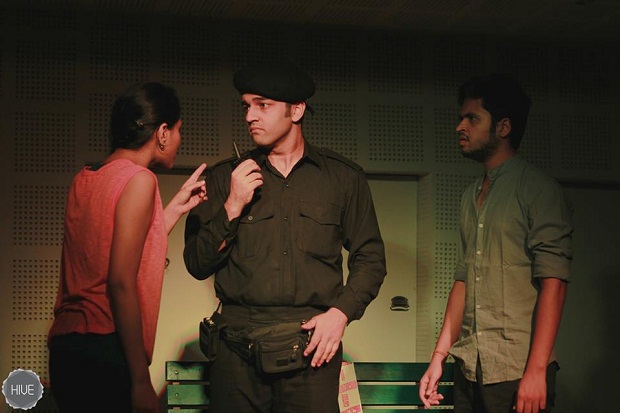
Divya Unny as Olivia, Dhruv Lohumi as Reiver, and Divyang Thakkar as Arthur
March 21, 2022: Franz Kafka once said, “Every revolution evaporates and leaves behind only the slime of a new bureaucracy.” That is presumably the intellect behind Kieran Lynn’s “An Incident At The Border,” an adaptation of which was performed at The Hive last week. The play was produced by Le Chayim Theatre (directed by Himanshu Sitalni) and enacted by Dhruv Lohumi, Divyang Thakkar and Divya Unny, who play the roles of Reiver, Arthur and Olivia respectively.
While lovers enjoying their time at the park is possibly one of those quintessential scenes that you would associate with all things lovey-dovey, what you don’t get to see on an everyday basis is the forming of two separate nation state, right through the middle of the bench. That’s what the entire play, plotted against a single setting of a park bench chronicles: the creation of borders not just across geographical sketches, but across life on a whole itself. In the play, the setting down of a paper tape border by a soldier between a couple leads to consequences of catastrophic proportions, but more on that following a bit of character sketches.
The three characters of the play displayed possibly the three tenets of human life with respect to authority and all things enforced upon. Reiver, the soldier who creates the border is that guy who is programmed to do exactly what he is told to do, in his own words, “a cog in the machine”. On one side, this reflects the exact nature of the work that he does: only that which is expected of him; nothing more, nothing less. On the other hand, it also presents this stark realization that Reiver is wallowing in self-importance, even though it is clear as day that he is just a pawn in the grander scheme of things (approximated by his constant calls to “George”, a senior he has neither met or knows more than a name about).
Then there is Olivia, ever-entertaining to the idea of “being involved”, being in the know of things, and being knowledgeable of all things worldly. Not only does this entail a certain level of smugness on her part, it also delves into her resentment of how her boyfriend Arthur thinks. If Reiver is Major Protocol, and Olivia is Miss Information, Arthur without a doubt is Captain Utopia: in his world, borders are just unnecessary imaginary lines; an anarchist, almost, in his thought processes, he is the meek one who deigns the simplicity of ducks as the primary need in human life.
That’s what this play is all about: the meeting of two people who seem to jump in and out of love with each other, more so with the introduction of an unrelated third person who triggers massive change. Throughout the play, changes in the mannerisms of the three characters are manifest, portrayals of which are done to a perfect T. The storyline is matched to perfection as is the flow, scene to scene.
What was beautiful about the play was the way the audience connected to different instances from start to finish: smirks from time to time from different members of the audience reflected a sense of connection with the play at a personal level. The play was everything: emotional, thought provoking, humorous and one that oozed with a deep vengeance towards bureaucracy and what it led to for the everyday man and woman. The only issue, if any, was the handling of lights and sound: for a play that delved deep into the mechanisms of using the two to their advantage, a few misses on cue meant a slight aberration from what would otherwise be the ultimate play portrayal.

















